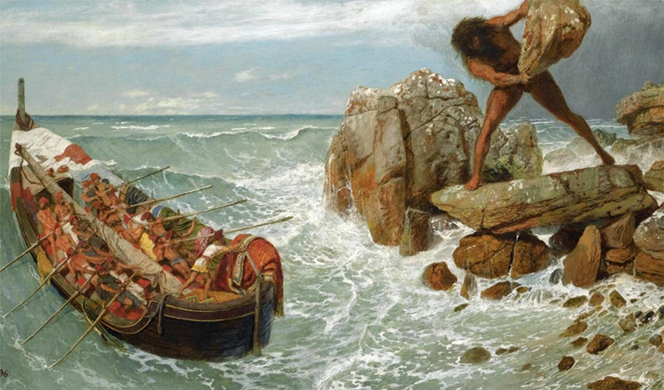
I was nineteen and taking an English class at a local university when I read Homer’s epic for the first time. The theme of this course dealt with various literary works wherein characters undertook journeys and attained as a consequence maturity or strength or wisdom or some other form of profound change. This theme intrigued me generally, but it struck me with special force when I read “The Odyssey”. Not long afterward I dropped out of college and enlisted in the Navy. Was Homer the inspiration for that four-year commitment? Not entirely but in part.
“The Odyssey” was written around 700 B.C. and the setting for it follows the fall of Troy. Though the book is populated by a great number of characters, both human and divine, the main protagonist is Odysseus—a Greek warrior/sailor/king who is striving to return to his beloved wife and homeland. His many adventures along the way are dangerous, exciting, strange, pleasant and amorous. The latter involves a lengthy stay with Kalypso, ‘a nymph, immortal and most beautiful, who craved him for her own’. And yet Odysseus ‘still hungered for home and wife’.
The most attractive feature of “The Odyssey” is its theme of love for home. You leave home—for one reason or another, willingly or unwillingly—only to desire a return to it. Moreover, you cannot really appreciate the value of home unless you experience the loss of it. That is what the word “journey” has come to mean to me.
On the other hand, the least attractive feature of “The Odyssey” is Odysseus’s homecoming—during which he slays a pack of extremely rude suitors who had been courting his wife. Odysseus subjects them to an unrelenting and merciless slaughter. This violent climax (which includes a number of female victims) debases the hero who, up to this point, seemed sympathetic and appealing.
Of course, “The Odyssey” is a myth; a very ancient myth. Its truth is artistic, so maybe one should not be too repelled by its various disagreeable elements (which include, by the way, graphically depicted animal sacrifices).
Homer’s work—“The Odyssey” and “The Iliad”—has been studied and analyzed and interpreted by scores of scholars and geniuses; going back to Aristotle, up to and beyond Nietzsche. Even so, no reader should feel intimidated. Either epic on its own can be enjoyed simply as an adventure book.
There are many translations of “The Odyssey”, but the one I have stuck with down through the years is Robert Fitzgerald’s. There is also a superb audio edition of the same that is read by Dan Stevens. To hear Homer’s work rather than to read it has certain advantages, especially if one considers that oral versions might have preceded the written version. Whether that is so or not, I don’t know. What I do know is that this Greek classic deserves its lofty reputation, and readers today might find in it, as I have, a great and personally meaningful literary experience.